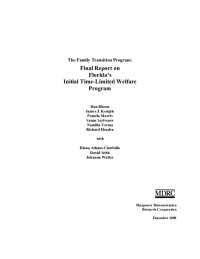The Family Transition Program
Final Report on Florida's Initial Time-Limited Welfare Program
Launched in 1994, Florida’s pilot Family Transition Program (FTP) was the first welfare reform initiative in which some families reached a time limit on their welfare eligibility and had their benefits canceled. Today, almost all states have welfare time limits (and there is a 60-month lifetime limit on federally funded assistance), although relatively few families have yet reached those limits.
FTP, which operated in Escambia County (including Pensacola) until 1999, limited most families to 24 months of cash welfare assistance in any 60-month period (the least job-ready were limited to 36 months in any 72-month period) and provided a wide array of services and incentives to help welfare recipients find work. Florida’s statewide welfare program incorporates many of the pilot program’s features but differs from it in key ways; thus, the evaluation of FTP did not assess the statewide program.
MDRC evaluated FTP under a contract with the Florida Department of Children and Families. Several thousand welfare applicants and recipients (mostly single mothers) were assigned, at random, to FTP or to the Aid to Families with Dependent Children (AFDC) group, which was subject to the prior welfare rules. FTP’s effects were estimated by comparing how the two groups fared over a four-year period.
Key Findings
- Reflecting a sharp decline in Florida’s overall welfare caseload, most families in the AFDC group left welfare during the study period. Nevertheless, owing to its time limit, FTP substantially reduced long-term welfare receipt: Only 6 percent of families in the FTP group received welfare for more than 36 months compared with 17 percent in the AFDC group.
- Relative to families in the AFDC group, FTP families gained more in earnings than they lost in welfare payments, resulting in a modestly higher average income for the FTP group. However, these gains in earnings and income came in the middle of the study period; by the end, the two groups were equally likely to be working and had about the same income.
- Only 17 percent of families in the FTP group reached their time limit during the study period. Most of the others did not accumulate 24 or 36 months of benefit receipt (some received 24 or 36 months, but were granted medical exemptions that stopped their time-limit clocks). Somewhat less than half of those who reached their time limit worked steadily in the subsequent 18 months, and many relied heavily on family, friends, Food Stamps, and housing assistance for support. Most of these families struggled financially, but did not appear to be worse off than many other families who left welfare for other reasons.
- FTP had few impacts, positive or negative, on the well-being of elementary-school-aged children. Among adolescents, however, children in the FTP group performed somewhat worse than their AFDC counterparts on a couple of measures of school performance.
The final results from the FTP evaluation show that, at least under certain circumstances, time limits can be implemented without having widespread, severe consequences for families. Nevertheless, caution is in order: FTP operated in a strong local and national labor market, had plentiful resources for staff and services, and imposed no lifetime limit on welfare receipt. Where these conditions do not hold, the consequences of time limits might differ from those found in this evaluation.
Source: FTP: Final Results of Florida’s Initial Time-Limited Welfare Program by Dan Bloom, James J. Kemple, Pamela Morris, Susan Scrivener, Nandita Verma, and Richard Hendra. The FTP evaluation was funded by the Florida Department of Children and Families, the U.S. Department of Health and Human Services, and the Ford Foundation. The organizations that funded the analysis of FTP’s effects on children are listed at the front of the report






